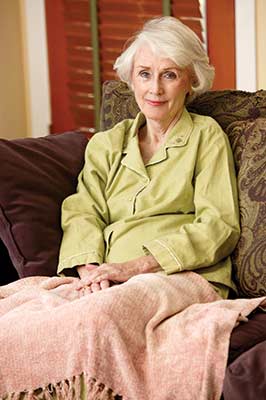A Caregivers Guide to Helping Your Loved One with Alzheimer’s Get Enough Sleep
“To sleep perchance to dream.” Unfortunately, for loved ones with Alzheimer’s disease, the gift of sleep is itself often just a dream.
Sleep is a vital human function that helps to restore us physically, cognitively and emotionally. However, according to the Alzheimer’s Association article, “Treatments for Sleep Changes,” people with Alzheimer’s disease frequently have sleep problems or experience significant changes in their sleep schedule. Scientists do not completely understand why these sleep disturbances occur, but they agree that they are a direct result of Alzheimer’s disease and its progressively destructive impact on brain cells.
 Common Sleep Problems of Loved Ones with Alzheimer’s
Common Sleep Problems of Loved Ones with Alzheimer’s
The evidence of scientific research demonstrates that sleep changes are more common in the later stages of the Alzheimer’s, but some studies have also identified difficulties in the early stages. The Alzheimer’s Association tells us that sleep changes caused by the disease frequently include:
- Difficulty falling and staying asleep – Individuals with Alzheimer’s tend to wake up more often and stay awake longer at night. They may wander, be unable to lie still or yell or call out.
- Daytime napping and other changes in the sleep-wake cycle – Your loved one with Alzheimer’smay feel very sleepy during the day and then be unable to sleep at night. You may find that he/she also becomes restless or agitated in the late afternoon or early evening due to a related condition called “sundowning.” Experts estimate that in the late stages of Alzheimer’s, individuals spend about 40 percent of their time in bed at night awake and a significant part of their daytime sleeping.
Proven Tips to Help Your Loved One Get the Sleep He/She Needs
The Alzheimer’s Association offers the following recommendations to create an inviting sleeping environment and promote rest for a person with Alzheimer’s:
- Maintain regular times for meals and for going to bed and getting up
- Seek morning sunlight exposure
- Encourage regular, daily exercise, but no later than four hours before bedtime
- Avoid alcohol, caffeine and nicotine
- Treat any pain
- If the person is taking a cholinesterase inhibitor (tacrine, donepezil, rivastigmine or galantamine), avoid giving the medicine before bed
- Make sure the bedroom temperature is comfortable
- Provide nightlights and security objects
- If the person awakens, discourage staying in bed while awake; use the bed only for sleep
- Discourage watching television during periods of wakefulness
Non-Drug Therapies Are the Preferred Course of Action
According to medical experts, studies have found that sleep medications generally do not improve overall sleep quality for older adults. Additionally, sleep medications have been linked to a greater chance of falls along with other risks that may outweigh the benefits of treatment. For those individuals who do require medication – for depression, sleep apnea or restless legs syndrome, for example – be sure to follow the advice and guidance of a physician.
Mayo Clinic: Sleep Is Essential for Caregivers, Too!
The Mayo Clinic article, “Alzheimer’s: Managing Sleep Problems,” cautions that sleep problems can also take a serious toll on the lives of caregivers. As they say, “Your loved one’s sleep is important, but so is yours. If you’re not getting enough sleep, you might not have the patience and energy needed to take care of your loved one.” They suggest that, if possible, have family members or friends alternate nights with you for caregiving responsibilities – or talk with your loved one’s doctor, a social worker or a representative from a local Alzheimer’s Association to learn what caregiving help is available in your area.
Help Is Available
Today a variety of resources is available to assist caregivers who are caring for their loved one at home. These include Alzheimer’s Association services, support groups, self-help guides, Respite Care services, in-home support, community-based services and educational programs.
For caregivers who recognize that the needs of their loved one are beyond what they can safely and appropriately provide in the home environment, leading residential memory care assisted living communities (MCALs), such as North Woods Village at Edison Lakes and its “New Directions”SM program, provide the full continuum of services that have been shown to improve health and well-being, support brain health and delay the progression of memory loss from Alzheimer’s disease and dementia.
At North Woods Village at Edison Lakes, we believe senior adults thrive in an environment that offers an active, vibrant lifestyle with a variety of activities that engage the mind, body and spirit. Our “New Directions”SM provides a safe, professional environment and proven, best-practice programs and services specifically designed to address the total physical, emotional and social needs of individuals with Alzheimer’s, dementia or other serious form of memory impairment.
For more information on Sleep and Dementia, contact us today!
